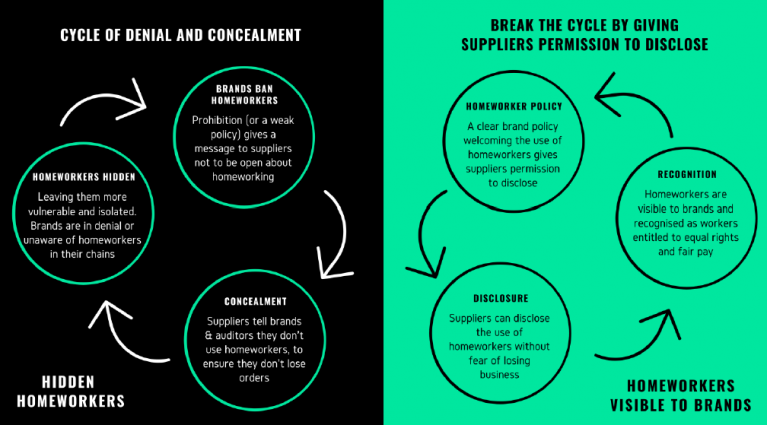
A new study, published today by Homeworkers Worldwide, will provide support to global brands and civil society organisations seeking to improve working conditions for homeworkers in their supply chains.
The study is part of the Hidden Homeworkers initiative, a 4-year programme led by Traidcraft Exchange, alongside HWW Cividep and HomeNet South Asia, and co-funded by the European Union, which aims to work collaboratively with brands and multi-stakeholder initiatives to create more visibility on homeworking and improve working conditions for homeworkers in apparel and footwear supply chains. Based on interviews with commercial and civil society practitioners with substantial experience of working with homeworkers in international apparel and footwear chains, it will be followed by a toolkit with resources known to improve transparency in homeworker chains.
Millions of women homeworkers are working in the global supply chains of apparel and footwear Brands. Organisations working with homeworkers estimate that in India alone 5 million homeworkers work in textile and apparel supply chains serving both domestic and global markets, of whom 3.5 million are in the supply chains of global brands.
Homeworkers have some of the worst conditions of any workers in the apparel and footwear sector. Their informal employment, in dispersed sub-contract chains beyond the factory, out of sight of auditors and inspectors, combined with weak protections in labour laws, leaves them at risk of exploitation and abuse. They do not receive sick pay, maternity or holiday leave or the social protection enjoyed by regular workers in the factory.
Brands that have looked have found homeworking in their supply chains in China, Italy and even the UK. Yet homeworkers are rarely identified in social audits and remain hidden to many brands whose products they are making.
Breaking the cycle of concealment
Homeworkers Worldwide and the Indian NGO, Cividep, have carried out research around barriers to transparency in homeworker chains. The principal barrier, identified by almost all the commercial and civil society practitioners interviewed, is the unwillingness of factories to open up their subcontract chains to scrutiny. Mixed messages from brands and, in particular, policies prohibiting homeworking give a message to suppliers not to be open about homeworking. This has led to a cycle of concealment by suppliers, with brands oblivious to or “in denial” about homeworking in their chains.
Brands can break this cycle by adopting a Homeworker Policy which allows homeworking and gives permission to their suppliers to disclose its presence.
Brands can break this cycle by adopting a Homeworker Policy which allows homeworking and gives permission to their suppliers to disclose its presence.
Collaborating to drive change
The study recommends brands take an inclusive approach towards homeworkers who may be part of their supply chains. Commercial and civil society actors bring different skills to the table and will have greatest impact through collaboration. Companies and multi-stakeholder initiatives should bring their policies in line with key international standards and seek sustainable change through collaboration towards sector-wide adoption of transparency mechanisms.
Download the report here. For more information contact Lucy Brill.

